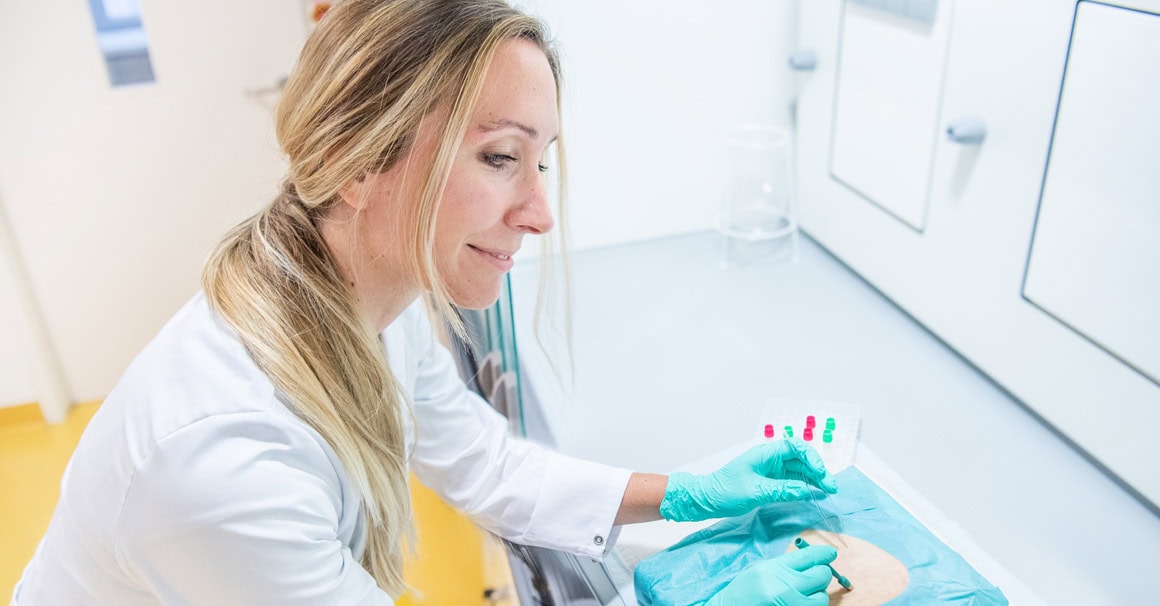- About us
- Research expertise
- DIGITAL – Institute for Digital Technologies
- MATERIALS – Institute for Sensorics, Photonics and Production Technologies
- ROBOTICS – Institute for Robotics and Flexible Production
- COREMED – Centre for Regenerative Medicine and Precision Medicine
- HEALTH – Institute for Biomedical Research and Technologies
- LIFE – Institute for Climate, Energy Systems and Society
- POLICIES – Institute for Economic, Social and Innovation Research
- Business areas
- Products and services
- Research infrastructure
- Participating interests
- Career
- News & events
- Publications
- Contact us
Biological method and model development

Method development for regenerative medicine, photo: JOANNEUM RESEARCH/Schwarzl
Effective translational in vitro and in vivo models are needed for the development of therapeutic approaches that will lead to a better understanding of the influence of the ageing process on wound healing. We are developing 3D skin models and preclinical in vivo models to investigate the impact of the ageing process on wound healing.
Testing the absorption of toxins through the skin is an important step in the assessment of potential health risks. Here, the focus is on in-vitro models taking into account skin condition and integrity, metabolisation, toxin uptake as factors in different age groups and skin types.
We develop in vitro, ex vivo and in vivo wound healing models for different types of wounds (chronic wounds, full-thickness wounds, burn wounds) to better understand wound healing and usher in new treatment approaches.
Chronic wounds are an increasing health problem and social issue. We conduct research into the underlying mechanisms behind the development of chronic wounds. New treatment concepts are developed and evaluated on the basis of our findings.
Pharmacokinetics is the study of the processes of absorption, distribution, metabolisation and elimination of active substances. Innovative methods enable us to observe these processes at tissue level. To do this, we use in vitro and in vivo methods in preclinical and clinical studies.
Innovative technologies combined with decades of experience in drug development and the interpretation of the data harvested make it possible to predict the clinical potential of drugs. Monitoring in the interstitial fluid of tissues replaces biopsies and improves the quality of the prognosis.
Cerebral Open Flow Microperfusion opens up unique access to the tissue in the central nervous system. This allows direct monitoring of biomarkers in the brain as well as the measurement of substance transport into the brain. Our focuses are dementia, glioblastoma, depression and the interaction of the gut microbiome with the brain.
Tumours can be introduced into intact, non-traumatised tissue as part of a highly controlled process in a minimally invasive procedure. As the interface grows into the tumour, observation and manipulation takes place without traumatisation.
We develop organ-on-a-chip systems and equip them with highly innovative microfluidic technology. These systems support the effective introduction of test substances and continuous monitoring. Models are created through validation with clinical and preclinical reference studies which can subsequently be used to reduce animal testing.
Products and services – Health and care
With cOFM, local drug distribution and biomarkers in the brain can be monitored - with the blood-brain barrier intact.
Projekte aus dem Geschäftsfeld Health and care

Your contact!
Shaping the future, together
JOANNEUM RESEARCH provides innovation and technology services in the field of applied research. As a research company working on behalf of various federal provinces and regions in Austria, our expertise shapes the development of our modern society and economy – sustainably, and always with a focus on people. As a multidisciplinary team working in a flexible set-up that fosters innovation, we always live up to the highest social and scientific standards.

